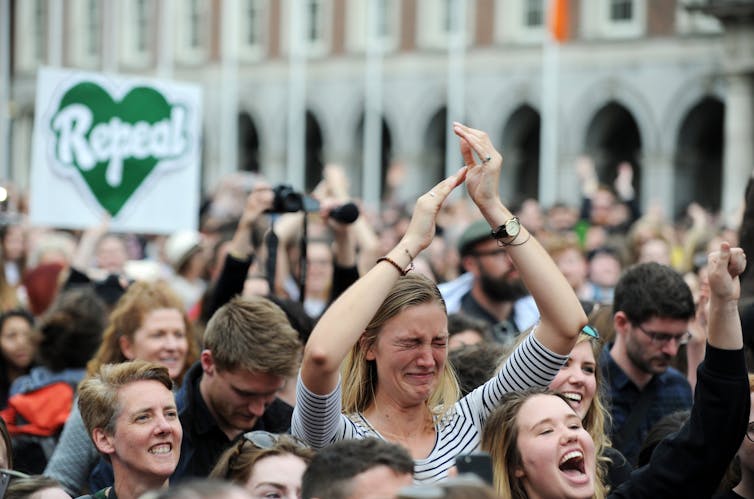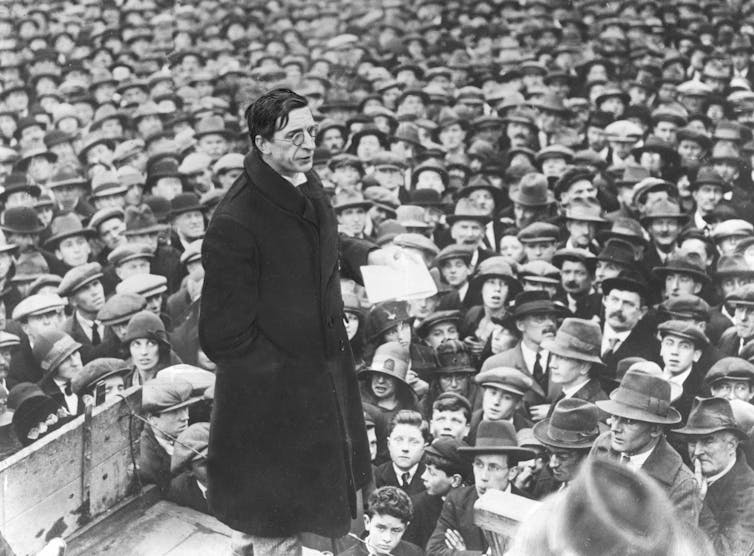It has been 87 years since feminist and activist Hanna Sheehy-Skeffington declared that the new 1937 Irish constitution was based on a “fascist model, in which women would be relegated to permanent inferiority”.
Several clauses were labelled “sinister and retrogressive” by women’s groups who feared gender bias embedded within the constitution would restrict Irish women to their domestic roles as wives and mothers.
Since the constitution entered into force, it has been amended 32 times. The ban on abortion, for example, was overturned in 2018 – a move that the current Irish Taoiseach (prime minister), Leo Varadkar, described as the latest step in a “quiet revolution” towards modernity.
On March 8 2024 (also International Women’s Day), the Irish electorate will vote once again to amend the constitution and formally change the status of women in Ireland. This time the choice is to either retain Article 41.2 – the “woman in the home” clause – or to replace it with Article 42B that acknowledges the wider concept of family care.
According to Article 42B, the state “recognises that the provision of care, by members of a family to one another by reason of the bonds that exist among them, gives to society a support without which the common good cannot be achieved, and shall strive to support such provison”.

The fact that it has taken 87 years for this to happen would have astounded the women who raised the alarm about Article 41.2 in 1937. Their overarching concern was that the text used reflected a prescriptive presumption that the primary function of women in Irish society was that of wife and mother.
Article 41.2 states that: “by her life within the home, woman gives to the state a support without which the common good cannot be achieved”. It also asserts that mothers “shall not be obliged by economic necessity to engage in labour to the neglect of their duties in the home”.
What women’s groups quickly recognised in 1937 was the inherent danger of assigning women a specific “social function” that was different from men. This perceived difference had already been used to limit the choices of women prior to 1937. The 1927 Juries Act, for example, made women exempt from automatic consideration for jury service.
Article 41.2 therefore had the potential to further restrict women’s lives, especially with regards to the right to engage in paid work outside the home. But where did the phrasing for Article 41.2 come from? And what ideology underpinned the assertion that the “natural” role for women was that of wife and mother?
The ‘natural’ social function of Irish women
The answer is simple. The text of Article 41.2 comes directly, nearly word for word, from Catholic doctrine.
Pope Leo XIII set out the “natural” duty of women in Rerum Novarum, a pastoral letter issued in 1891. It stated: “woman is by her nature fitted for home work and it is this which is best adapted to preserve her modesty and promote the good upbringing of children and the wellbeing of the family.”
In 1931, another papal letter, Quadregesimo Anno, was published by Pope Pius XI. The pope proclaimed that: “Mothers, concentrating on household duties, should work primarily in the home or in its immediate vicinity.”
Six years later, in 1937, Taoiseach Éamon de Valera oversaw the drafting of the new Irish constitution. The influence of his Catholic advisors is self-evident.

In the archives of the Archbishop of Dublin, John Charles McQuaid, a document reflecting on the position of women in the constitution stated that: “it is an unreality to imagine that the position of an electoral vote abolishes for either men or women…diversity of social function. Nothing will change in law and fact of nature that woman’s natural sphere is in the home.”
Another pope, Benedict XV, was cited in the same document giving the opinion that no “new state of things, nor course of events can ever snatch woman, if she realises her mission, from that sphere which is natural to her – the family”.
Finish the ’quiet revolution’
We shouldn’t be surprised that the vernacular of Catholic social teaching, with its pronouncements on the “natural” and prescribed social function of women as wives and mothers, became entrenched in the Irish constitution. The influence of the Catholic church was omnipresent in Irish homes, schools, the media and every aspect of public life throughout the 1920s and 1930s.
Its power was evident in the passing of legislation outlawing divorce, access to birth control and abortion. It infiltrated all aspects of social and cultural life, banning dances or censoring Hollywood films and literature deemed to be a moral danger.
What we should be surprised about is that Article 41.2 is still in the Irish constitution. Today, Ireland is a secular nation. Its citizens now have access to divorce, birth control, legal abortion and equal marriage rights.
Ireland is also a nation slowly, and painfully, coming to terms with the trauma inflicted by the abuses of the Catholic church in schools, mother and baby homes and Magdalene laundries. And yet it still has Article 41.2.
Read more: The Woman in the Wall: BBC drama about Ireland's Magdalene Laundries is essential viewing
If Ireland is to fully shake off the shackles of its Catholic past and achieve its ambition to be a modern and progressive nation, then Article 41.2 must be consigned to the annals of history on March 8 2024.

